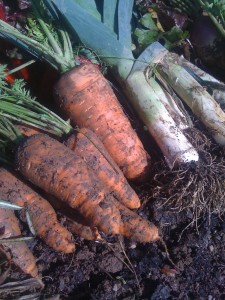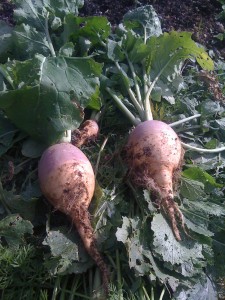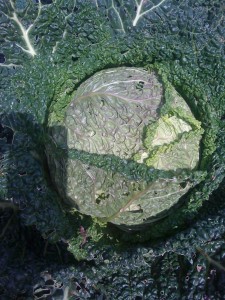 Might the Rain Itself Bring a Brighter Future for Irish Veg?
Might the Rain Itself Bring a Brighter Future for Irish Veg?
Relentless rain may spell disaster for many of this season’s crops – but could that rain itself turn out to be the proverbial silver lining in the storm clouds that have been gathering over Irish vegetable production in recent years?
Eat more veg, we’re constantly told – OK that makes sense, but where does it come from? Or not, as the case may be.
Shortage of supply is a very real problem at the moment, but it’s nothing new. It may not have been obvious to consumers, who have always had well-laden shelves to pick their veg and salads from, but chefs who take pride in showcasing local produce have been complaining about the difficulties of sourcing Irish-grown vegetables for years.
We like to think of ourselves as a ‘growing’ country, but decades of undervaluing our Irish-grown vegetables have taken their toll and it’s now taking a crisis caused by extreme weather to illustrate the point.
 Until now, buyers for the big supermarkets have been in a strong position to call the tune and, confident in the knowledge that they could fill the shelves with imports, they’ve been able to beat the prices paid to local producers down – and ultimately force many of them out of production altogether. Cheap food policy is an issue, of course, but it wouldn’t work without big buyers distorting the market. And now, thanks to the fact that the bad weather also extends to other parts of Europe and affects the availability of cheap supplies from the usual fall back countries, the devastating effects of widespread purchasing procedures and price discounting are at last likely to be exposed by shortages on the shelves.
Until now, buyers for the big supermarkets have been in a strong position to call the tune and, confident in the knowledge that they could fill the shelves with imports, they’ve been able to beat the prices paid to local producers down – and ultimately force many of them out of production altogether. Cheap food policy is an issue, of course, but it wouldn’t work without big buyers distorting the market. And now, thanks to the fact that the bad weather also extends to other parts of Europe and affects the availability of cheap supplies from the usual fall back countries, the devastating effects of widespread purchasing procedures and price discounting are at last likely to be exposed by shortages on the shelves.
A news item in the Irish Farmers Journal (21/7/12; Pat O’Toole) caught my eye the other day. Quoting an IFA description of the current scarcity as ‘inevitable’, it summed the situation up neatly as the result of ‘farmers being forced to accept sustained losses in recent years’ – and said ‘the supply shortages being experienced by retailers must serve as a wake-up call…At some point supply shortages in Ireland were bound to coincide with poor output in Europe. Now, retailers have no cheap imports available to them, they realise the importance of certainty of supply, something that can only be guaranteed by Irish producers.’
 So maybe – just as the recession has brought a lot of unexpectedly positive side effects – this year’s appalling weather could actually be the catalyst that’s needed to re-energise Irish vegetable production. But any inconvenience caused by shortages this year won’t stop the habits that have brought the major retailers massive profits for so long – consumers need to support Irish growers and demand Irish produce in the shops. We’re getting pretty good at doing it for some foods – notably fresh meats and dairy products – now it’s time to throw our collective weight behind the farmers and Buy Irish Veg! And, farmers please note – clear branding, such as we’re seeing now from producers such as Keoghs and Donnelly really helps consumers to make an informed choice.
So maybe – just as the recession has brought a lot of unexpectedly positive side effects – this year’s appalling weather could actually be the catalyst that’s needed to re-energise Irish vegetable production. But any inconvenience caused by shortages this year won’t stop the habits that have brought the major retailers massive profits for so long – consumers need to support Irish growers and demand Irish produce in the shops. We’re getting pretty good at doing it for some foods – notably fresh meats and dairy products – now it’s time to throw our collective weight behind the farmers and Buy Irish Veg! And, farmers please note – clear branding, such as we’re seeing now from producers such as Keoghs and Donnelly really helps consumers to make an informed choice.
Georgina Campbell 









Wet, wet, wet
Relentless rain may spell disaster for many of this season’s crops – but could that rain itself turn out to be the proverbial silver lining in the storm clouds that have been gathering over Irish vegetable production in recent years?
Eat more veg, we’re constantly told – OK that makes sense, but where does it come from? Or not, as the case may be.
Shortage of supply is a very real problem at the moment, but it’s nothing new. It may not have been obvious to consumers, who have always had well-laden shelves to pick their veg and salads from, but chefs who take pride in showcasing local produce have been complaining about the difficulties of sourcing Irish-grown vegetables for years.
We like to think of ourselves as a ‘growing’ country, but decades of undervaluing our Irish-grown vegetables have taken their toll and it’s now taking a crisis caused by extreme weather to illustrate the point.
A news item in the Irish Farmers Journal (21/7/12; Pat O’Toole) caught my eye the other day. Quoting an IFA description of the current scarcity as ‘inevitable’, it summed the situation up neatly as the result of ‘farmers being forced to accept sustained losses in recent years’ – and said ‘the supply shortages being experienced by retailers must serve as a wake-up call…At some point supply shortages in Ireland were bound to coincide with poor output in Europe. Now, retailers have no cheap imports available to them, they realise the importance of certainty of supply, something that can only be guaranteed by Irish producers.’
Georgina Campbell